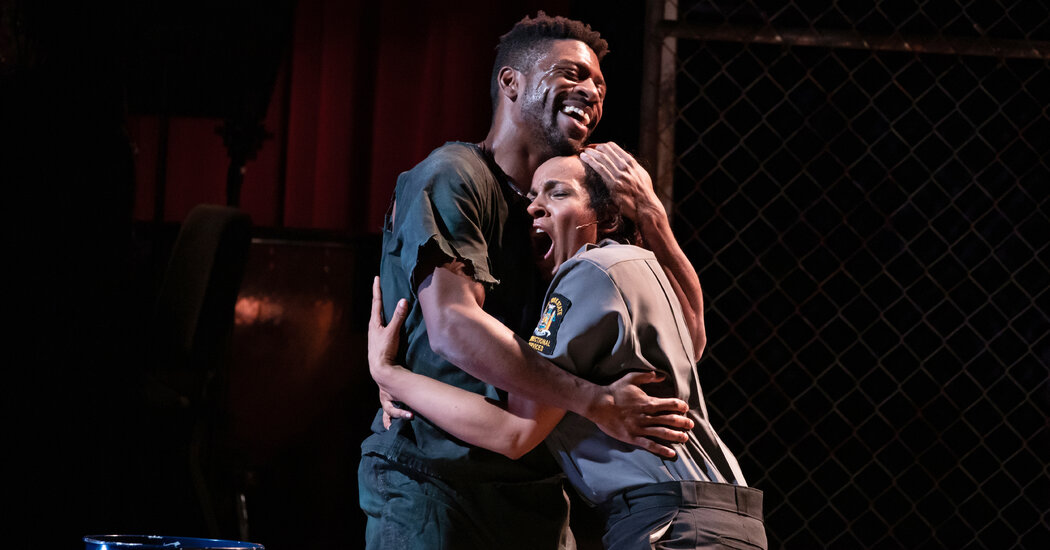
Beethoven’s only opera, “Fidelio,” is hardly a fixed text. He wrote several possible overtures for it and reworked the score substantially over the course of a decade. But its meaning never changed: the heroism to be found in devotion, love and freedom in the face of injustice.
In 2018, the daring and imaginative Heartbeat Opera — an enterprise that, while small and still young, has already contributed more to opera’s vitality than most major American companies — took the malleable history of “Fidelio” one step further, adapting the work as a moving indictment of mass incarceration.
That production has now been revised for a revival that opened at the Grace Rainey Rogers Auditorium at the Metropolitan Museum of Art last weekend, ahead of a tour that continues through the end of the month. Already inspired by the Black Lives Matter movement, this “Fidelio” is now permeated with it, and the adaptation is even more powerful.
In Beethoven’s original singspiel — a music theater form in which sung numbers are set up by spoken scenes — a woman named Leonore disguises herself as a man, Fidelio, to infiltrate the prison where her husband, Florestan, is being held for political reasons. She aims to free him from execution while exposing the crimes of his captor, Pizarro.
Ethan Heard, a founder of Heartbeat, adapted “Fidelio” for the company and collaborated with the playwright Marcus Scott on the new book. Their revision tells the story of a Black Lives Matter activist named Stan — sung by Curtis Bannister, a tenor of impressive stamina — who has been imprisoned for nearly a year, and whose wife, Leah, given an affectingly agonized lower range by the soprano Kelly Griffin, is at a breaking point as she struggles to free him.
She gets a job as a guard at the prison; her strategy to reach Stan in solitary confinement (much as in Beethoven’s original) is to ingratiate herself with a senior guard (here Roc, sung with both charm and dramatic complexity by the bass-baritone Derrell Acon) and court his daughter (here Marcy, smooth-voiced yet strong in the soprano Victoria Lawal’s portrayal). In this telling, there is no need for the cross-dressing: Marcy and Leah are both queer. And, crucially, all of these characters are Black, a fact that looms before guiding the awakenings of Marcy and her father as they face their complicity in a racist system that, Leah says, is designed to punish “people whose only mistake was being poor and Black.”
The spoken text is in English throughout, while the arias remain in their original German — a testament to the timelessness of Beethoven, though the production’s surtitles take some liberties with the translation. (As an excuse for briefly letting the prisoners out into the sun, Roc sings that it’s the king’s name day, but the titles say that it’s Martin Luther King Jr. Day.)
Radically transformed, too, is the score, arranged by Daniel Schlosberg for two pianos, two horns, two cellos and percussion, with the multitasking (and nearly scene-stealing) Schlosberg onstage, conducting from the keyboard. Expressive cellos reveal the characters’ thoughts, and the horns add an aura of muscularity and honor. The most substantial interventions are in the percussion, with drum hits deployed to dramatic effect and a whiplike slap adding terror to Pizarro’s murder-plotting “Ha, welch’ ein Augenblick.”
Not all the changes from 2018 were necessary, or wise. Starting with the venue: This production originated in a black box space at Baruch Performing Arts Center, which fit the chamber scale of the music and emphasized the cinder-block claustrophobia of Reid Thompson’s set. At the Met, the show floats on an expansive stage and struggles with poor acoustics.
And the text has lost some of its grace, with pandering references to the Jan. 6, 2021, insurrection and President Donald J. Trump’s infamous call for the Proud Boys to “stand back and stand by.” A casualty of these lapses is the baritone Corey McKern’s Pizarro, who is something of a Trump stand-in, a caricature among nuanced, human characters.
You could almost forgive that at “O welche Lust,” the famous prisoners’ chorus, still the emotional high point of the production and now a coup de théâtre. For the stirring number, Leah unlocks a chest — a metaphor for the prison gates — to release a white screen, on which a video is projected, featuring 100 incarcerated singers and 70 volunteers from six prison ensembles. The camera often lingers on individual faces, to an effect not unlike that of Barry Jenkins’s filmmaking, the way his sustained close-ups invite intimacy and, above all, sympathy.
For curious audience members, Heartbeat has shared letters from some of the participants. They range from endearing — Michael “Black” Powell II’s “German was hard!!” — to profound, such as this from Douglass Elliott: “Most of us are victims of our circumstances who when faced with adversities chose the wrong direction with our actions. This choir makes us feel that ‘normal’ feeling for a short time every week. We are accepted as humans, not looked at as numbers.”
Beethoven’s triumphant finale could have been an insult to the contemporary reality Heartbeat’s production aims to conjure. So after Stan is freed and Pizarro defeated, Leah awakes at the same desk where, in the opening, she has had a frustrating phone call with a lawyer. This twist, that it was all a dream, is of course a tired trope, but what follows isn’t.
After a moment of despair — her happiness felt so real — she stands, steps to a spotlight at center stage and holds up her phone, assuming the pose of her husband’s activism, with which the production began. An ambivalent closing scene, it is an honest reflection of our time: of the mixed successes of Black Lives Matter, yes, and of the only possible way forward.
Fidelio
Performed at the Grace Rainey Rogers Auditorium, Manhattan, and touring through Feb. 27; heartbeatopera.org.




